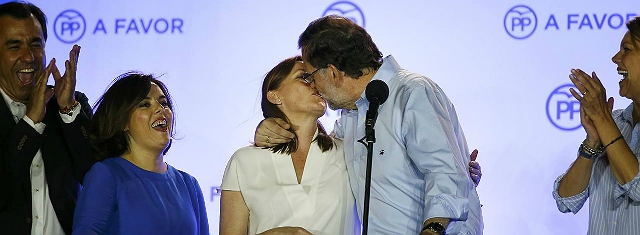Politics
Conservatives win the legislative elections in Spain although they need a pact
The Socialist Party resists as second

Rajoy kiss his wife in electoral night (Source: RTVE)
Of the four major Spanish political parties, the Conservative Popular Party (PP) is the only rising in votes and MPs, to get 14 seats more than in the legislative elections of December 20, 2015. The other three (the Socialist Party, the centrist Citizens and the coalition between communists and left-wing populist United we Can) lose support. Hardest hit is the centrist Citizens in December 2015 'stole' a million votes the Popular Party and now has been punished by the agreement signed last legislature with the Socialist Party and veto Mariano Rajoy.
The Popular Party won 7,553,126 votes, compared with 5,218,920 votes polled by the Socialist Party. The coalition between communists and left-wing populists United we Can won 4,842,505 votes and centrist Citizens won 2,972,782 votes. Some "bad" and "unexpected" in the words of the leader of United we Can, Pablo Iglesias, who was "concerned" about the progress of the conservative bloc. Citizens also described as disappointing results and the Socialist Party said his second place to hide the failure of his candidacy.
But Sunday's elections have not clarified the Spanish political landscape. No party can govern alone and possible agreements also ensure the possibility of governing. The conservative PP won 33.03% of votes and 137 deputies. Second, the Socialist Party (PSOE its acronym in Spanish) achieved 22.66% of votes and 85 deputies, five less than in December 2015. Although their worst historic election result, the Socialists resisted the thrust of the coalition between communists and left-wing populist United we Can, third with 21.10% of votes and 71 deputies. It is the same number that added between the two formations in the last legislature. And, fourthly, the centrist Citizens was the great survivor of this election.
He lost eight deputies and stayed with 32 and 13.05% of votes. Popular Party sources reported that Conservatives will contact Monday with the Socialist Party and Citizens, to offer dialogue on a possible pact between the three that allow the formation of a Government with sufficient parliamentary support. They might Conservatives both the favorable vote of the PSOE and abstention in the investiture session. Meanwhile, Socialist sources emphasized its willingness to dialogue but rejected the possibility of facilitating the PP Government.
The Popular Party won throughout Spain, except in three provinces of Andalusia (traditional socialist stronghold), in the Basque Country and Catalonia. If in December 2015 the distance between the Conservatives and the Socialist Party was 36 seats after the legislative elections this Sunday that difference rises to 52 deputies. Resounding victory, therefore, Conservatives, if agreed upon with Citizens, would achieve a majority over a possible pact between Socialists and United we Can. The composed of PP and Citizens conservative bloc would get 169 seats, seven less than the absolute majority needed to invest president on the first ballot, while a hypothetical left front formed by Socialists and United we Can left with 156 seats.
Another 25 MPs sit in Parliament representing regional parties, including the Catalan nationalists, Basque and Canary Island. They may have the key to the future Government because of them depend on who the next Prime Minister of Spain. But the truth is that the acting President of the Spanish Government, Mariano Rajoy, is it best to repeat mandate. Despite resistance in the second position, the candidate of the Socialist Party, Pedro Sanchez, harvested this Sunday for the second time the worst election result of his party and his position in front of the PSOE is threatened.
In the Senate, the Popular Party revalidated its absolute majority, gaining 130 of the 208 seats at stake. That means four more than in December 2015. The Socialist Party, second, lost four senators and gets 43 seats. The coalition between Communists and left-wing populist United we Can repeated with 16 senators. Catalan Republicans get 10 seats, four more than six months ago, while Basque nationalists lost one and left with five senators, Catalan nationalists lose four and are left with two senators and canaries nationalists retain their only senator.
Liability for this article lies with the author, who also holds the copyright. Editorial content from USPA may be quoted on other websites as long as the quote comprises no more than 5% of the entire text, is marked as such and the source is named (via hyperlink).






